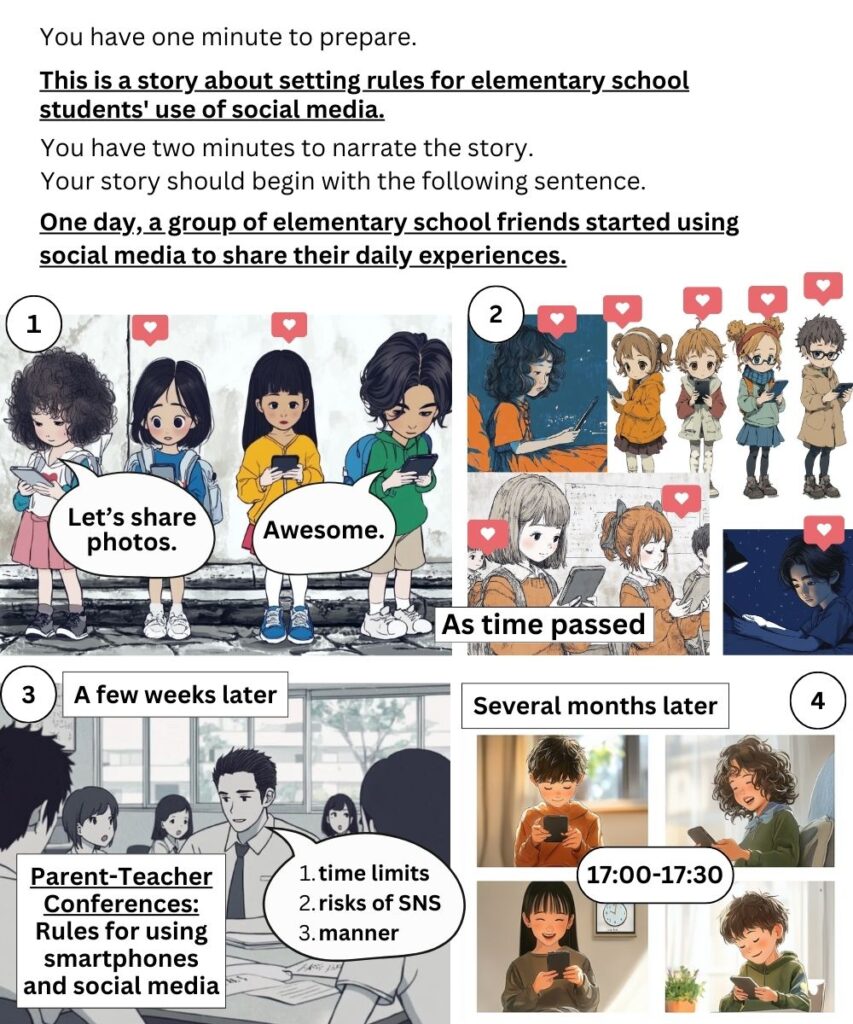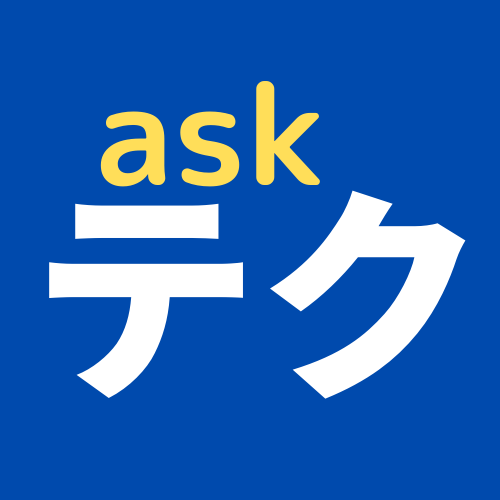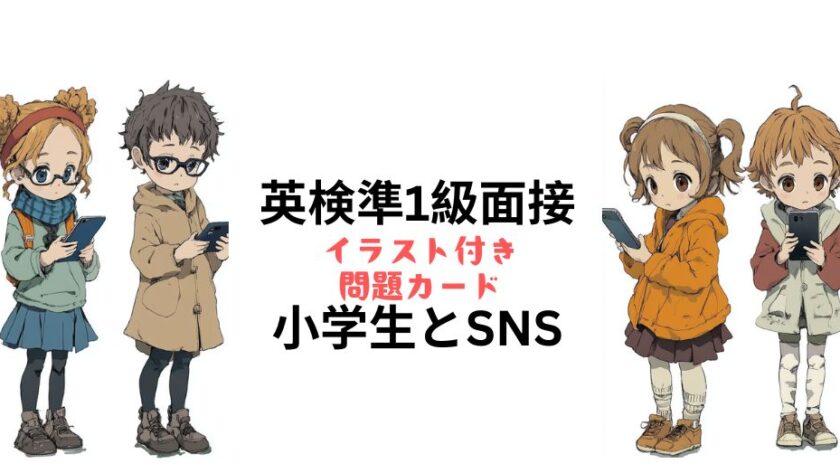メタディスクリプション:
実際の出題形式(問題カード)で英検準1級の面接練習を独学できるページです。
2024年度リニューアル対応!
所要時間:概ね8分
目次
- 1 質問概要
- 2 問題カード
- 3 ナレーションと質問
- 4 質問音源チャレンジ
- 5 解答例
- 6 小学生とSNSジョーク
- 6.1 1. Why did the elementary student bring a ladder to social media?Because they wanted to reach the “high” likes!
- 6.2 2. Why did the elementary student put their report card on social media?They wanted to get more “followers” for their A’s!
- 6.3 3. Why did the elementary student start a blog?To write about “playground politics!”
- 6.4 4. Why don’t elementary students like to use Twitter?Because they can only “tweet” about recess!
- 6.5 5. Why did the elementary student keep refreshing their Instagram?They were waiting for a “snack” update!
- 6.6
質問概要
ナレーション内容を考える(1分間)
イラストの内容を説明するナレーションを考える
ナレーション(2分間):ナレーションを始める
※2分以上続く場合は、途中でも中止させられるので注意
Q&A(No. 1):イラスト関連の質問
イラストに関連した質問。「問題カード」を見ながら解答できます。
※登場人物が考えている事などを聞かれます。
Q&A(No.2, No. 3)
問題カードに関連した、受験者の意見を問う質問
Q&A(No. 4)
問題カードのトピックに少し関係のある質問。受験者の意見を問う質問
※この<No. 4>質問文に「導入文」が追加されました。
問題カード

ナレーションと質問
ナレーション指示
<指示>Look at the pictures carefully and read the directions silently for one minute.(1分間)
<指示>Now, please begin your narration.(2分間)
Question No.1
Please look at the third picture. If you were one of the parents, what would you be thinking?
Question No.2
Do you think it is important for children to use social media?
Question No.3
Do you think parents should set limits on their children’s social media use?
Question No.4
Recently, concerns have been growing about the impact of social media on children. Do you think schools should ban the use of social media for elementary school students?
質問音源チャレンジ
本番のように、英語の質問を聞いて答える練習をしてみましょう。
ナレーション準備
ナレーション開始
Question 1 mp3
Question 2 mp3
Question 3 mp3
Question 4 mp3
解答例
ナレーション例
全文音源:
<1> One day, a group of elementary school friends started using social media to share their daily experiences. They were excited and began by sharing photos and commenting on each other’s posts, finding it a fun way to stay connected.
ある日、小学生の仲良しグループが、日常の出来事を共有するためにSNSを使い始めた。彼らはこのアイデアに興奮し、写真を共有したり、お互いの投稿にコメントしたりして楽しんだ。
「commenting on each other’s posts」コメントには「on」をお忘れなく。日常的によく使う動作は、前置詞も含めて正確に押さえておくのがミソやね。
<2> As time passed, the children became increasingly absorbed in social media. They spent more time online, often checking their phones during study time and even before bed. The excitement of sharing and receiving likes made it hard for them to focus on their schoolwork.
時間が経つにつれて、子供たちはますますSNSに夢中になっていった。彼らはオンラインで過ごす時間が増え、勉強中や寝る前にもスマホをチェックするようになった。共有したり、いいねをもらったりすることの興奮で、学校の勉強に集中するのが難しくなっていた。
SNS関連の単語やフレーズ
1. post a comment – コメントを投稿する
2. share a post – 投稿をシェアする
3. follow someone – 誰かをフォローする
4. like a post – 投稿に「いいね」をする
5. tag someone – 誰かをタグ付けする
6. direct message (DM) – ダイレクトメッセージ(DM)
7. go viral – バズる
8. upload a photo – 写真をアップロードする
9. friend request – 友達リクエスト
10. update status – ステータスを更新する
<3> A few weeks later, concerned parents and teachers held a meeting to discuss the issue. They decided to establish rules for the students’ use of smartphones and social media. These rules included setting time limits, educating the students about the risks of social media, and teaching proper online etiquette.
数週間後、心配した親や教師たちが会議を開き、この問題について話し合った。彼らは、子供たちのスマホやSNSの使用に関するルールを決めることにした。これらのルールには、時間制限の設定、ソーシャルメディアのリスクについての学生への教育、適切なオンラインエチケットの指導が含まれていました。
「online etiquette」と「manner」の使い分け
どちらも「マナー」や「礼儀」だけど、微妙にニュアンスが異なるよ。
Etiquette: これは特定の社会的または文化的な状況において、期待される行動規範や礼儀作法を指す。例えば、フォーマルな場や特定のルールが存在する状況で使用されることが多い。
Manner: こちらは、一般的な日常生活や人々の行動における基本的な礼儀や態度を指す。広範な文脈で使われることが多く、行動や習慣そのものを指す場合が多い。
SNSやインターネットの使用に関しては、「etiquette」の方が一般的に適切だよ。なぜなら、インターネット上での礼儀作法や行動規範を指す場合、具体的なルールやガイドラインを意識することが多いため。「ネットエチケット(Netiquette)」という言葉があるように、オンラインでの適切な行動規範を意味する際に「etiquette」がよく使われるんやで。
<4> Several months later, the children adjusted to the new rules. They limited their social media use to a designated time, from 5:00 to 5:30 PM, and became better at balancing their online and offline lives. As a result, they could enjoy their online interactions while staying focused on their studies and other activities. (185 words)
数か月後、子供たちは新しいルールに適応していた。彼らはSNSの使用を午後5時から5時30分までの指定時間に制限し、バランスを取れるようになった。その結果、オンラインの交流を楽しみながら、勉強にも集中できるようになった。
Question 1 解答例
質問:3枚目の写真を見てください。あなたが親の一人だったら、何を考えていますか?
If I were one of the parents, I would be concerned about how much time my child spends on social media. I would also be thinking about how to help them understand the importance of balancing online activities with their studies and other responsibilities.
私が親の一人だったら、子どもがどれだけソーシャルメディアに時間を費やしているかについて心配しているでしょう。また、オンライン活動と勉強や他の責任とのバランスを取ることの重要性を、子どもにどうやって理解させるかを考えていると思います。
Question 2 解答例
子どもたちがソーシャルメディアを使うことは重要だと思いますか?
Yes. Social media can help children stay connected with their friends and learn to express themselves in different ways, which is important for their social development.
はい。ソーシャルメディアは子どもたちが友達とつながり続け、自分を様々な方法で表現するのに役立ち、それが社会的な発達にとって重要だと思います。
No. While social media can be fun, it’s not essential for children, and too much use can distract them from their studies and other important activities.
いいえ。ソーシャルメディアは楽しいかもしれませんが、子どもたちにとって必須ではなく、使いすぎると勉強や他の重要な活動から気が散ることがあります。
「気が散る」
1. The noise outside diverted his attention from his homework.
(外の騒音が彼の宿題から注意をそらした。)
2. She lost focus when her phone kept buzzing.
(彼女は携帯電話が鳴り続けたため、集中力を失った。)
3. He got sidetracked by the TV and forgot to finish his project.
(彼はテレビに気を取られて、プロジェクトを終えるのを忘れた。)
4.: She was too preoccupied with her thoughts to concentrate on the lecture.
(彼女は考え事で頭がいっぱいで、講義に集中できなかった。)
5. He was distracted by the loud music coming from the next room.
(彼は隣の部屋からの大音量の音楽で気が散った。)
6. It’s easy to lose concentration in a noisy environment.
(騒がしい環境では集中力を失いやすい。)
7. She felt unfocused after staying up late last night.
(彼女は昨晩遅くまで起きていたため、集中できなかった。)
Question 3 解答例
親は子どもたちのソーシャルメディアの使用に制限を設けるべきだと思いますか?
Yes. Setting limits on social media use can help children avoid spending too much time online and encourage them to focus on other important activities, like studying and playing outside.
はい。ソーシャルメディアの使用に制限を設けることで、子どもたちはオンラインでの過度な時間を避け、勉強や外で遊ぶなど、他の重要な活動に集中するように促すことができます。
No. Instead of setting strict limits, parents should teach their children how to manage their time responsibly and make good choices about when and how to use social media.
いいえ。厳しい制限を設けるのではなく、親は子どもたちに時間を責任を持って管理し、いつどのようにソーシャルメディアを使うべきかを教えるべきだと思います。
Question 4 解答例
近年、ソーシャルメディアが子どもたちに与える影響について懸念が高まっています。学校は小学生にソーシャルメディアの使用を禁止するべきだと思いますか?
Yes. Social media can be distracting and expose young children to inappropriate content. Banning its use in elementary schools can help children focus on their studies and develop healthier social habits.
はい。ソーシャルメディアは気を散らし、幼い子供を不適切なコンテンツにさらす可能性があります。小学校での使用を禁止することで、子どもたちが勉強に集中し、健全な社会的習慣を身につけることができるでしょう。
No. Instead of banning social media, schools should focus on teaching students how to use it responsibly and safely. This way, children can learn important digital skills while being aware of the potential risks.
いいえ。ソーシャルメディアを禁止するのではなく、学校は生徒たちに責任を持って安全に使う方法を教えるべきです。そうすることで、子どもたちは潜在的なリスクを認識しながら、重要なデジタルスキルを学ぶことができます。
面接練習はask本校にお尋ねください:無料体験レッスン予約
こちらの投稿もおススメです:英検準1級面接問題カード|在宅勤務トピック質問と回答例
小学生とSNSジョーク
小学生がSNSに梯子(はしご)を持ってきたのはなぜ?
「高い」いいねを手に入れたかったからだよ!
解説:
このジョークは、「高い(high)」と「たくさんのいいね(likes)」のダブルミーニングを使っています。梯子を使って「高い」位置に到達するという物理的な意味と、SNSでたくさんの「いいね」をもらうことをかけています。
小学生がSNSに成績表を載せたのはなぜ?
A(優秀な成績)で「フォロワー」を増やしたかったからだよ!
解説:
このジョークは、SNSでフォロワーを増やすという現象と、成績表で優秀な成績(A)を誇ることをかけています。小学生が「フォロワー」を増やすために、成績をSNSにアップするというユーモラスなシチュエーションを描いています。
3. Why did the elementary student start a blog?
To write about “playground politics!”
小学生がブログを始めたのはなぜ?
「校庭の政治」について書くためだよ!
解説:
このジョークは「プレイグラウンド・ポリティクス」(校庭の政治)というフレーズを使って、小学生の日常生活で起こる小さな出来事やドラマを面白く表現しています。大人が政治について書くように、小学生が校庭での出来事をブログに書くという風刺です。
4. Why don’t elementary students like to use Twitter?
Because they can only “tweet” about recess!
日本語:
小学生がTwitterを使いたがらないのはなぜ?
休み時間のことしか「つぶやけ」ないからだよ!
解説:
このジョークは、「tweet」(つぶやく)というTwitter用語と、休み時間に起こる出来事(recess)に関連付けています。小学生にとっての一大イベントである「休み時間」しか話題がないというユーモラスな視点を表しています。
5. Why did the elementary student keep refreshing their Instagram?
They were waiting for a “snack” update!
小学生がInstagramを何度も更新したのはなぜ?
おやつの「アップデート」を待ってたからだよ!
解説:
このジョークは、小学生の食べ物への関心を利用したものです。「アップデート」(更新)という言葉を、SNSの更新とおやつに関連付け、面白い状況を作り出しています。




